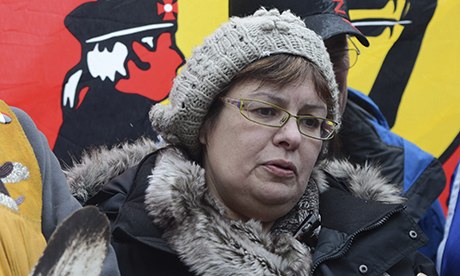Struggle for decolonization in Canada by First Nations requires respect and understanding of treaties
From theGuardian.com
The First Nations of Canada are still waiting for the colonial era to end
The government continues to ignore the sovereignty of indigenous inhabitants, even though it was granted in 1763
21 October 2013
 Attawapiskat First Nation chief Theresa Spence who went on hunger strike in 2012. Photograph: Sean Kilpatrick/AP
Attawapiskat First Nation chief Theresa Spence who went on hunger strike in 2012. Photograph: Sean Kilpatrick/AP
The Canadian prime minister, Stephen Harper, recently made a throne speech, in which he spoke of the settlers who founded the country: "They dared to seize the moment that history offered. Pioneers ... reached a vast continent. They forged an independent country where none would have otherwise existed."
This genocidal logic finds its companion image in the photos released last week, of 700 heavily armed Royal Canadian Mounted Police officers in a stand-off in New Brunswick with the Elsipogtog Mi'kmaq First Nation and their allies, who are currently defending their lands from the predatory activities of a Houston-based company conducting shale gas explorations. Over the past days, peaceful protesters have been pepper-sprayed, shot at with rubber bullets, and more than 40 people have beenarrested.
Earlier this month, a group of First Nations elders travelled to London to mark the 250th anniversary of the royal proclamation of 1763. They did so, in part, as a reminder of the existence of promises made by the British crown to the First Nations of Canada. Issued by King George III at the conclusion of the Seven Years' War, the proclamation recognised that all unceded lands of Indians would be left as such until they were ceded by way of treaty with the British crown. The document thus recognised indigenous rights to their land and, at the same time, asserted the underlying crown title to all of Britain's colonial possessions in what was to become Canada. The proclamation emerged at a time when the British crown and First Nations were negotiating treaties on a nation-to-nation basis. And in this paradox lies the heart of settler colonialism today: the recognition of indigenous rights on the basis of their prior occupation of the land, now enshrined in section 35 of the Canadian constitution, along with the ongoing assertion of colonial sovereignty.
The First Nations delegates' journey to London, like so many others that date from the 16th century onwards, was an expression of sovereignty. As Chief Perry Bellegarde, of the Federation of Saskatchewan Indian Nations (FSIN), remarked, the Canadian government was not particularly pleased with news of the trip to London, which included numerous speaking engagements along with ceremonies to mark the anniversary. At the same time, indigenous scholars and activists such as Professor Pamela Palmater have drawn attention to another view, that indigenous sovereignty does not emanate from this act of colonial recognition. She reminds us: "Indigenous peoples were already living as strong, independent sovereign nations prior to contact and did not need a British edict to declare partial recognition of their land rights."
Palmater is a member of the Mi'kmaq First Nation. The Mi'kmaq, like First Nations throughout the country, are no strangers to violence at the hands of the state and settlers. Ongoing violence, sometimes lethal, is part and parcel of contemporary forms of dispossession. Throughout the autumn of 1999, for instance, Mi'kmaq fishermen on the east coast faced physical violence and harassment at the hands of non-aboriginal fisherman after the supreme court of Canada reaffirmed the treaty right of the Mi'kmaq people to trade fish for necessaries. The storm of protest on the part of non-aboriginal fishermen and their subsequent plea to the courts resulted in a highly unusual supplementary judgment, in which the court reassured the petitioners that they had not affirmed a treaty right that was outside of state regulation. Settler populations must not be made to feel uncomfortable.
The Mi'kmaq blockade, along with numerous other nationwide solidarity protests, reflect a resurgence of indigenous sovereignty activism, its recent iteration the Idle No More movement. It kicked off in December 2012, when Chief Theresa Spence, of the Attawapiskat First Nation, began a hunger strike in protest at bill C-45, now the Jobs and Growth Act 2012, the second piece of omnibus legislation introduced by the Harper regime that is radically transforming the legal landscape of immigration and refugee rights, environmental law, and First Nations' rights. The act makes it very easy for communally held reserve land to be alienated and privatised through leasing the land, which will surely work in favour of corporate interests who want access to resource-rich native territory. The provisions damage democratic processes on reserves, and work to the disadvantage of members of First Nations who live off-reserve yet maintain strong ties to their communities. The legislation also removes environmental protection from hundreds of waterways, jeopardising the interests of all Canadians, native and non-native alike. Much could be said of how this makes a mockery of the crown's duty to consult First Nations on matters that may affect their lands and resources.
Expressions of sovereignty take many forms. The refusal to accept an imperial constitutional order that alchemically transmuted British treaty obligations to the Canadian state is one; another is the outright non-recognition of imperial declarations such as the royal proclamation as a source of self-determination. The standoff is one manifestation of a long-standing and growing struggle for decolonisation in Canada.
